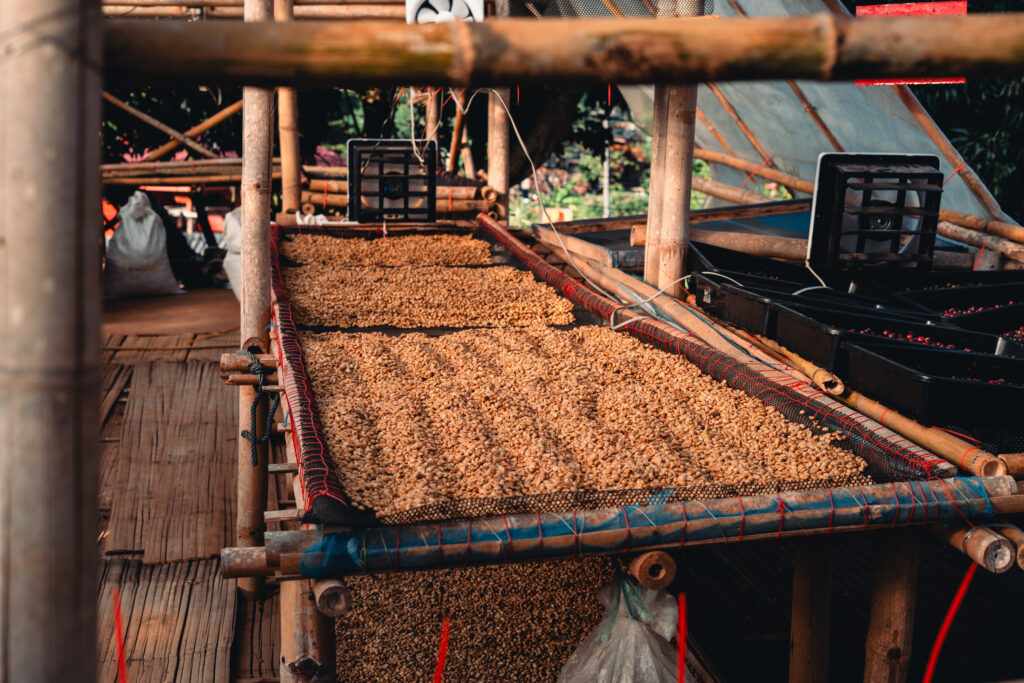Coffee, processing plays a crucial role in shaping the flavors and quality of your morning cup. One of the most intriguing methods of coffee processing is the natural process, a time-honored technique that brings out distinctive flavor profiles while offering certain environmental benefits. So, what makes natural-process coffee unique? Let’s dive in.
What is Natural Coffee Processing?
Overview and History
Natural coffee processing, also known as the dry process, is one of the oldest methods used in the coffee world. Dating back to when coffee was first cultivated in regions with limited water resources, it involves drying the coffee cherries with their skin intact, exposing the beans inside to the sugars and pulp of the fruit. This method contrasts with more modern processes like washed or honey processing, which involve removing the fruit before drying.
How Natural Processing Works
In the natural process, coffee cherries are harvested and immediately spread out to dry, often on raised beds or drying patios under the sun. The cherries must be rotated frequently to ensure even drying and to avoid mold growth. The process can take several weeks, during which the beans absorb flavors from the cherry, resulting in a unique and sometimes unpredictable flavor profile.
Comparing Coffee Processing Methods
Natural vs. Washed
- The washed process, the most common method, involves removing the cherry before drying. This results in a cleaner, more consistent flavor, often preferred by roasters who want to highlight the beans’ inherent qualities without interference from the fruit. In contrast, natural-process coffee retains more of the fruit’s sugars, leading to bolder, more complex flavors.
Natural vs. Honey
- Honey processing falls between the natural and washed methods. The cherry is partially removed, leaving some mucilage on the bean during drying. This method balances the fruity characteristics of natural process coffee and the clean flavors of washed coffee.

Where is Natural Process Coffee Most Common?
Key Regions: Ethiopia, Brazil, Yemen
The natural process is most commonly used in regions with scarce water resources, or the tradition has deep roots. Ethiopia, widely considered the birthplace of coffee, still relies heavily on this method. Brazil and Yemen also favor natural processing because their arid climates allow cherries to dry efficiently in the sun.
Benefits of Natural Process Coffee
Unique Flavor Profiles
- Natural process coffee is known for its rich, fruity, and sometimes earthy flavors. Tasting notes often include berries, stone fruits, and wine-like qualities, making these coffees a favorite among adventurous coffee drinkers looking for complexity in their cups.
Environmental Advantages
- Natural processing requires far less water than washed coffee, making it more environmentally friendly in regions with limited water resources. The process also involves less equipment, reducing the energy footprint associated with coffee production.
Suggested Read: Exploring the Unique Taste of Green Coffee
Challenges of Natural Processing
Fermentation Issues
- One of the biggest challenges with natural processing is controlling fermentation. Since the cherries dry with the fruit intact, fermentation can occur unevenly, leading to flavors some drinkers may find undesirable, like overly funky or fermented notes.
Inconsistent Flavors
- Because natural processing relies heavily on environmental factors like sun exposure and humidity, there’s a greater risk of inconsistency. Even slight weather changes can affect the final flavor, which can be problematic for roasters and consumers seeking reliability.
What Does Natural Process Coffee Taste Like?
Fruity, Earthy, Complex Flavors
- Natural process coffees are often described as having bold, fruit-forward flavors. Berries, dried fruit, and even chocolate notes are common, with some coffees exhibiting a funky, almost fermented taste. The intensity of these flavors can vary widely, contributing to the uniqueness of the natural method.
Who Enjoys Natural Process Coffee?
Specialty Coffee Drinkers
- Natural process coffee is a thrilling adventure for specialty enthusiasts who relish the wild, sometimes unpredictable flavor profiles. The complexity and depth of these coffees offer a tasting experience that washed, and honey-processed coffees may need more.
The Debate Around “Funky” Flavors
- However, only some are fans. Some roasters and coffee drinkers find the intense fruity and fermented flavors off-putting. This divide has sparked lively debates within the coffee community about the merits of naturally processed coffee, inviting everyone to join the conversation.
Conclusion: The Unique Appeal of Natural Process Coffee
Natural process coffee stands out for its rich flavors, environmental benefits, and deep connection to coffee-growing traditions. While it may not offer the same consistency as washed or honey-processed coffees, its unparalleled and unique taste makes it a must-try for adventurous drinkers. If you’re looking for a coffee that tells a story with every sip, natural process coffee is an exciting journey worth exploring. It plays a crucial role in shaping the flavors and quality of your morning cup. One of the most intriguing methods of coffee processing is the natural process, a time-honored technique that brings out distinctive flavor profiles while offering certain environmental benefits.

